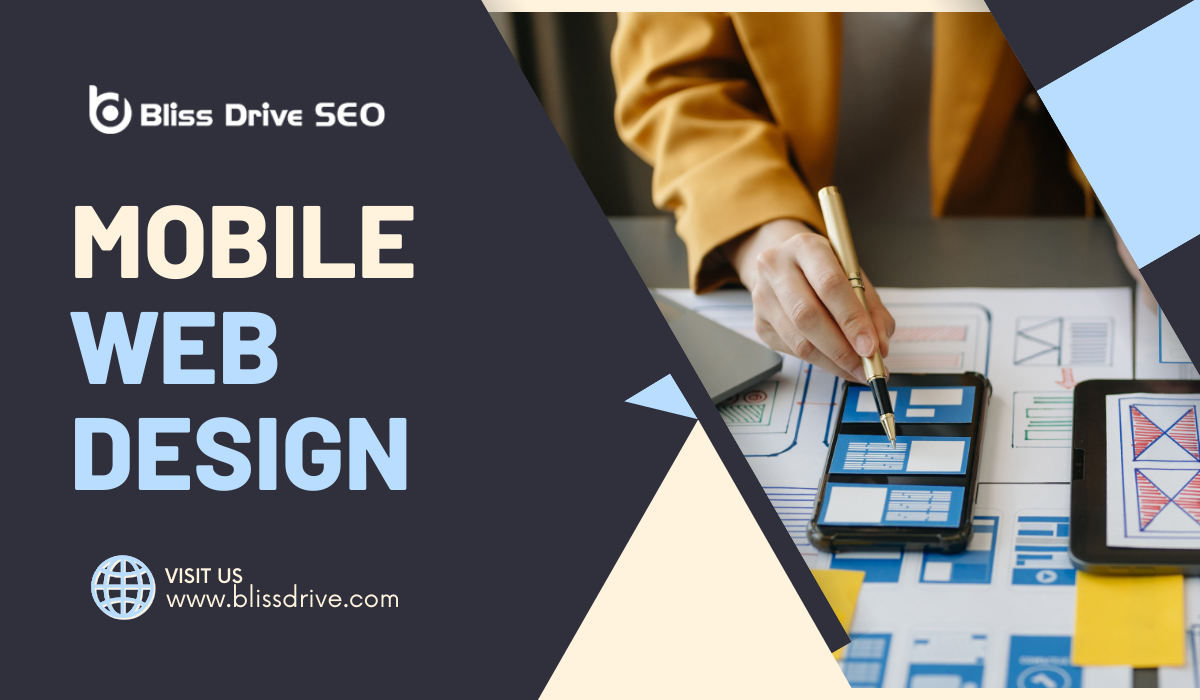Learn More About Us

Remember the time when mobiles were just an extension of the internet? Well, not anymore. Mobile is now the primary means for online browsing, which underscores the importance of mobile web design in today's digital landscape.
So, let’s dive into our comprehensive guide to mobile web design, mastering the art of crafting engaging user experiences.
Let's answer a fundamental question first: What is mobile web design? In the simplest terms, mobile web design is the practice of creating websites that work flawlessly on smaller screens, offering a seamless user experience. It's not just about shrinking your desktop website, but about rethinking and redesigning it for the mobile environment.
The differences between mobile and desktop web design are not just about screen size. It's about considering elements like touch versus click, thumb-friendly navigation, fast load times, concise content, and more. In the next section, we'll explore these differences and how they impact user experience.
The term "responsive design" has been a buzzword in the realm of mobile web design. But why? It’s a design technique that allows websites to adjust their layout and content based on the device they’re viewed on. It's all about providing a uniform experience across multiple screen sizes.
Next up, let's talk about mobile navigation. It's crucial for a mobile site to have an intuitive, touch-friendly navigation system that allows users to find what they're looking for with minimal taps and swipes.
What makes a design user-centric? And how does it benefit mobile web design? Here, we dive into the importance of empathy in design and how understanding your users can leadA potential customer referred by an affiliate who has shown interest in the product or service but h... to a better mobile experience.
Empathy in design is key to creating superior mobile experiences. It fosters a user-centered approach, considering the real-life scenarios, goals, and challenges of users. Empathy is vital for ensuring accessibility, taking into account users' diverse abilities and interactions with technology. It allows for an emotional connection, providing experiences that resonate with users on a personal level. By deeply understanding users, designers can identify and address real problems, creating meaningful solutions.
An empathetic approach leads to intuitive, user-friendly interfaces, reducing friction points and improving overall usability. Therefore, empathetic design isn't just about functionality, but also about creating enjoyable, accessible, and impactful mobile experiences.
Microinteractions are small, subtle animations or design elements that help guide users and provide feedback. When done right, they can significantly improve the mobile user experience.
Accelerated Mobile Pages (AMP) is a powerful tool for enhancing mobile site performance and user experience. By utilizing AMP's lightweight HTML/CSS framework, you can create web pages that load significantly faster, leading to a smoother, more responsive user experience.
AMP helps prioritize important content optimally by utilizing the available bandwidth. It also streamlines multimedia handling and provides a cache feature, preloading pages to further speed up loading times. By reducing bounce rates and improving mobile searchUsing a mobile device to conduct internet searches. engine rankingsThe position at which a website appears in the SERP., AMP can effectively boost your site's performance, resulting in increased user engagementThe level of interaction and involvement users have with social media content. and satisfaction.
A craftsman is only as good as their tools. Let's uncover some of the best tools available for creating and optimizing mobile websites.
Responsive designA web design approach that makes web pages render well on a variety of devices and window or screen ... frameworks like Bootstrap and Foundation are invaluable for building sites that work seamlessly on different screen sizes. JavaScript frameworks such as React or Angular are used for crafting interactive elementsElements that require user interaction, such as buttons, forms, and sliders., while Chrome DevTools and Firefox Developer Tools provide essential debugging capabilities.
Google's Lighthouse offers performance testing for your mobile web application, providing actionable feedback. For version control and collaboration, Git is widely used. Task runners like Gulp or Webpack automate tasks to enhance productivity. Furthermore, mobile UI frameworks like Ionic or React Native can speed up development with pre-built UI components. These tools collectively facilitate an efficient, optimized mobile web experience.
To wrap things up, mobile web design is not just about making websites mobile-friendly. It's about creating engaging, intuitive, and easy-to-use experiences that meet the demands of the mobile era.
Key elements include responsive design, mobile navigation, readability, fast load times, and thumb-friendly design.
With a majority of internet traffic coming from mobile devices, it's crucial to have a website that performs excellently on mobile to enhance user experience and ensure business success.
Google uses mobile-first indexingGoogle’s practice of using the mobile version of a website for indexing and ranking., meaning it primarily uses the mobile version of content for indexingThe process of adding web pages into a search engine's database. and ranking. Thus, an optimized mobile website is crucial for good SEO performance.
Responsive design is a web design technique that enables websites to change their layout and content based on the device they're viewed on.
AMP is a Google-backed project designed to make mobile pages load quickly and run smoothly. It is particularly useful for content-rich sites like blogs and news platforms.
Check out the top website designs for small businesses that can significantly enhance your online visibility.
